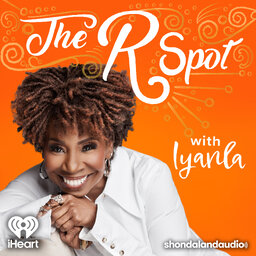The Love Jones Cohort with Dr. Kris Marsh: Part 1
In this week's episode, Iyanla is joined by professor and author Kris Marsh to get into the hot topics in her book The Love Jones Cohort. They talk about the importance of intersectionality, how class intersects with dating, and why you should stop asking people, "Why are they single?" Tune in next week for part 2 of the conversation!
Do you want to be on the podcast? Follow Iyanla on social media for the latest call-in information!
Instagram & X: @IyanlaVanzant
Facebook: @DrIyanlaVanzant
In 1 playlist(s)
The R Spot with Iyanla
Each week, New York Times best-selling author and famed spiritual life coach, Iyanla Vanzant, invite…Social links
Follow podcast
Recent clips

Permission to be Vulnerable with Kier Gaines
56:41

The Love Jones Cohort with Dr. Kris Marsh: Part 2
36:46

Challenging Lessons In Love
54:10
 The R Spot with Iyanla
The R Spot with Iyanla